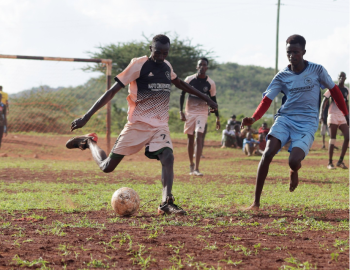Supporting local adaptation efforts to leverage scientific and Indigenous knowledge in western Mozambique
Supporting local adaptation efforts to leverage scientific and Indigenous knowledge in western Mozambique
Context
Manica Province is blessed with resources but burdened by demographic pressures, entrenched poverty and growing inequality and threatened by an increasingly volatile climate. Following cyclone Idai in 2019, severe cyclones hit Manica Province each year, and the number is expected to worsen. Meanwhile, population growth (2%+) and inadequate investment in alternative livelihoods drive land degradation, thereby increasing people’s vulnerability. Communities in the three landscapes targeted by this project, namely the Chimanimani, the Lower Zambezi Valley, and Chimoio, have all reported biodiversity loss not only due to deforestation but also due to land degradation, overexploitation of local biodiversity, including certain bee species. The growing demand for herbal medicine exacerbates this.
Although many efforts are underway at the local level to reduce these impacts and build resilience, they are often isolated, and little is appreciated about the connections between small local actions and broader impacts. Additionally, there is an urgent need to empower young people and recognise their leadership roles and potential. In Mozambique, young people are sidelined, with established older elites running organisations, events, meetings, and processes despite the energy, dynamism, innovation, and commitment that young people in the area continuously demonstrate.
Project objectives
To create strategies for addressing climate risks by integrating traditional knowledge, scientific expertise, practices, and technologies. This includes climate-smart farming techniques, the use of Indigenous food crops, and community-driven efforts in ecosystem management.
Project activities
The project will work with 30 communities across the province to highlight and support local adaptation efforts, such as planting Indigenous food crops in three landscapes. This work is focused on leveraging these existing initiatives to share learning, document practises, and influence policy at the subnational and national levels. Specifically, the project will:
- Document traditional forms of ecological governance displaced by modern land and resource management systems and work with communities to reintegrate them.
- Work alongside existing, community-led natural resource management committees or other local groups to support practical actions that can create examples of how people can adapt to become more climate resilient, including forest restoration, soil and water management, and erosion control. Micaia will also work to show how these local actions improve climate resilience in the face of the increasing climatic threats in Manica.
- The Gonzololo Youth Network will use these examples to help urban youth better understand the challenges faced by their rural neighbours, specifically in Chomio. The network will facilitate meetings with its members in the area to discuss local challenges and how to address them.
- Gonzololo will also lead the school programme in Chimoio and in the district towns of Sussundenga, Guro, Macossa and Tambara, where the team, with support from an environmental education and biodiversity expert, will facilitate discussion groups and recreational activities with school children to support improved climate literacy.
- Micaia Foundation will host multi-stakeholder workshops with national government representatives, private sector players, and civil society organisations to showcase some of the challenges and success stories from their work to influence educational programme content, provincial projects and plans, and national policies.
For more information on the K2A projects, please contact the K2A manager, Essia Guezzi, via email: Essia@southsouthnorth.org

